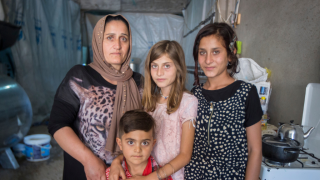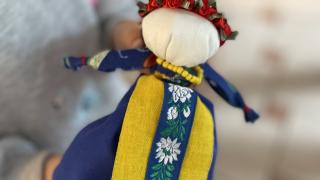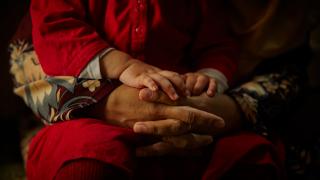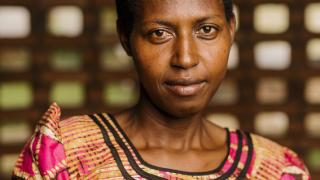5 Myths & Misconceptions About Refugees
5 Myths & Misconceptions About Refugees
Beyond the refugee headlines are real people - mostly women and children - trying to build a better life, after leaving everything behind.

Shocking statistics and clickbait headlines perpetuate damaging stereotypes about refugees. Other marginalised communities face this too - and it only causes harm.
This World Refugee Week, Women for Women International is here to help separate fact from fiction. By unpicking common myths and misconceptions, we increase our understanding and are better placed to help refugees heal and rebuild their lives.
Myth 1: Refugees are 'a crisis'.
Fact: So long as war and conflict continue, people will continue to flee them.
For some people, the idea of 'a global refugee crisis' might evoke empathy. But for most, it makes people think there's something to fear; that we’re at 'breaking point'.
News stories move from one issue to the next, quoting shocking statistics and sharing dramatic soundbites - but they don't address the underlying causes of what has become known as 'the refugee crisis'. The real crisis lies in why people have been forced to flee their homes and seek refuge elsewhere. The real crises are the conflicts in Ukraine and Sudan, the war on women's rights in Afghanistan, the twelve-year-long fighting in Syria - and others.
We need to address the root causes of displacement and fix the border and resettlement systems so that refugees can find safety. The crisis is not that people flee danger, but why and what happens when they do. Asylum is a human right, not a privilege or a luxury - that’s another misconception.
Myth 2: Refugees never return home.
Fact: Many refugees would prefer to live in their home countries, if only it were safe - and many do return.
Negative stereotypes perpetuated by agenda-driven media sources and politicians claim that many refugees are here for economic gains and have come for our jobs, with no plans to leave. But across the world, surveys have shown that most refugees would return home if the situation was safe. For the women refugees and survivors of war Women for Women International serve, security threats have forced them to flee - to leave everything they know behind.
From a survey of 1,100 displaced Syrians, 73% said they would return home if the conditions were right.
In this video, Syrian activist Hamza al-Kateab shares what he misses most about the country he was forced to flee. Hamza lived through the siege of Aleppo before leaving Syria and his experiences are documented in the film @forsamafilm, directed by his wife and Women for Women International Ambassador, Waad al-Kateab. Now in the UK, Waad and Hamza campaign with @actionforsama to end the targeting of healthcare facilities in Syria and now also in Ukraine.
This video is from March 2022. Since then, more than 8 million people have fled the war in Ukraine.
Myth 3: Most refugees are coming to Europe, North America and Australia
Fact: 83% of refugees are hosted in low- and middle-income countries
The UN’s refugee agency, the UNHCR, says that there are more people displaced by conflict in the world today than at any point in time since the Second World War. This is true, with an estimated 100 million refugees worldwide, almost half of them being women. But contrary to the misleading headlines, 83% are living in low- and middle-income countries.
Today, only five countries host 36% of worldwide refugees. The top two countries being Turkey and Colombia, hosting 3.7 million and over 2.5 million people, respectively.
We also know that most refugees (around 69%) flee to neighbouring countries. As the conflict in Sudan has unfolded, we have seen that people are seeking refuge in bordering countries like Chad, South Sudan, Egypt, Ethiopia and the Central African Republic. For hundreds of thousands of these people, this is not their first refugee experience. They were living in Sudan as refugees when this war broke out and many have now been forced to return to their home countries under adverse conditions.
Myth 4: Refugees are taking our jobs and ruining our economies and communities.
Fact: Research shows that refugees have positive social and economic impacts.
Contrary to the popular myth that refugees are bad for the economy, refugee women could actually generate and contribute $1.4 trillion to the annual global GDP. Enabling refugee women access to full employment would bring significant gains for host countries and help close the gender gap in earnings.
The thing that saves me is my work. I work with people I love. I work with women who talk and hug each other. We support each other.
In general, refugees can bring more value to a country's economy than it costs to resettle them - if only they are granted the right to work. In the UK, for example, training a new doctor is estimated to cost between £200,000 and £250,000, whereas supporting a refugee doctor to practice in the UK costs around £25,000 - there are about 1,200 medically qualified refugees recorded on the British Medical Association’s database.
We also know that refugees contribute significantly to our social structures. We see that children in the UK asylum system contribute positively to schools across the country, which then enables more successful integration of families into local communities.
Myth 5: “There’s nothing I can do to help refugees.”
Fact: We all have the power to make a difference.
All of us can do something to support refugees. Whether it is welcoming refugees into your own community, raising awareness about the cause or showing you stand with them and believe in their power, you can make a difference.
My dear friend, hello from the bottom of my heart. Your support means a lot to me. It makes me stronger for challenges in life.
Today, you can send a message of support and solidarity to a woman survivor of war to show her she's not alone. Your personal message will be translated and delivered directly to a woman refugee, telling her that you stand alongside her.
Read more
Olga
subtitle:
If someone had told me in the past that I would need to restart my life from scratch, I couldn't believe it. But that is what happened to me when I needed to flee to Poland with my son.
Sameera
subtitle:
The friendly environment at the training centre and connections I made with other women changed my life.
Francine
subtitle:
Francine fled Rwanda during the 1994 genocide. When she returned, she had to stop her education and find work. Married at an early age, she soon found it difficult to work and provide for her growing family, but beekeeping changed everything.




